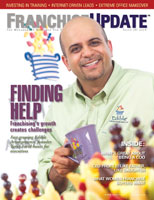How Franchisors Have Failed at International Master Franchising, and What They Can Do to Succeed in the Future
What was happening in the franchisor community? The Italian legislature had proposed that no franchisor be allowed to offer franchises in Italy unless it had a history of operating at least two units in the country before it began franchising. Ultimately, Italy adopted a more flexible experience standard. Then China adopted a two-unit, one year of experience standard as a precondition for franchising there in its 2004 Franchise Measures.
When the International Franchise Association (IFA) tried to rally the World Franchise Council, a group of national franchise associations, Director General of the British Franchise Association Brian Smart argued in favor of the Chinese restriction. As he pointed out, it is similar to the European Franchise Federation's (EFF) requirements that a company have "operated a business concept with success, for a reasonable time and, in at least one profitable unit before starting its franchise network." (EFF Code of Ethics, 1972)
What was going on? On visits to various countries and in meetings with consultants and lawyers from many of the principal targets of U.S. franchisors' expansion efforts over the last two decades, we have heard the same thing over and over. Americans' master franchising programs were not working as they should. Not by a long shot.
However, Dr. John Hayes had surveyed all the master franchisees he could find in 2000, and the results that he reported were very positive toward master franchising (see "Master Franchisees Take Franchising Around the World," www.hayesworldwide.com, click on FranchiseU). Thirty percent of master franchisees he surveyed were so happy with their investments that they were looking to pick up another master franchise.
However, all was not perfect with international master franchising. Fifty percent of respondents to the Hayes survey reported that their biggest problems were in selling franchises or generating franchise sales leads. Ironically, selling franchises in a master franchise territory is the principal reason that franchisors grant master franchises, and the reason they negotiate development schedules into each of their agreements. Other principal complaints of master franchisees were: franchisors not understanding the master franchisee's market (33 percent); lack of franchisor support (25 percent); and inadequate training (20 percent).
Most studies of international franchisors indicate that 80 to 85 percent of U.S. franchisors usually use master franchising as their typical expansion approach. Nonetheless, reverberations from the countries that have hosted foreign master franchises have been mixed. Professional franchise consultants from countries that have been the target of U.S. franchise development complained that too many master franchisees were not succeeding, and criticized both the adequacy of the support franchisors were providing and the costs that agreements required local master franchisees to bear (see Zwisler, "Finding the Right International Master Franchise Partner," Franchising World, April 2005).
In late 2005, Dr. Arturs Kalnins, associate professor at the Cornell University School of Hotel Administration released his study of international master franchise agreements negotiated by restaurant franchisors ("Biting Off More Than They Can Chew: Unfulfilled Development Commitments in International Master Franchising Ventures"; www.hotelschool.cornell.edu/chr). He found that international master franchising practices used by restaurant franchisors, including many of the most mature and best known, have been problematic. Only 39 percent of the international master franchisees he studied were still in business at the end of their development periods. Of the 55 of 142 master franchisees still in business at the end of their development periods, the median number of units in operation was three (3), notwithstanding a median development commitment of 34 restaurants. Only 6 of the 142 master franchisees, 4.2 percent, actually met their development commitments. Twenty-one master franchisees did not open a single unit!
For everyone who views franchising as the most successful way of starting a business, the results are horrible. Is master franchising an inherently flawed technique for international expansion? No, according to the Hayes survey.
But why were so many commitments not met? Why would a large development commitment doom a master franchisee?
It is probably a result of at least two factors. First, business plans have not been realistic about the cost and difficulty of building a franchise program in the territory. Hayes found that master franchisees' biggest reported problem was their inability to sell franchises. If franchisors are not providing adequate support and training to enable their master franchisees to successfully develop franchises and to act as self-sufficient franchisors, master franchisees quickly fall behind their performance targets and their financial projections. Despite their contractual commitments, they either elect not to go forward, or are unable to finance further growth.
Second, average unit volumes have been below projections or break-even, eliminating the incentive to continue with development. Such failures could be the result of poor planning, poor testing in the market, a lack of adequate support, or a combination of all of these factors.
What is the solution?
If the surveys are to be credited, these five steps should be considered in international master franchising agreements:
1) Research and test. Both franchisors and master franchisee candidates should research the market and test the viability of the concept through modeling, using the best available information for each market when developing a plan for that specific market. Then, the franchisor and the master franchisee should focus on proving the concept in the territory by refining operations at the first prototype unit(s) before engaging in further development.
2) Exercise patience. Master franchisee candidates and franchisors may both argue that the time and cost required to prove (or "re-prove") the concept in prototype units before beginning a development program is too great. As logical as this suggestion to "re-prove" a concept in a new country may be, it competes with development pressures that arise from master franchise programs, and with the level of investment often demanded by master franchise "partners."
Testing before franchise recruiting delays royalty income for both parties. Because neither party is likely to recoup its investment until many franchisees are paying fees, both parties are motivated to develop quickly. The incentive to develop quickly collides with the need to have a tested product to sell, and a master franchisee who is well trained and supported in their new role.
Kalnins' study demonstrates the flaws in using the old, large territory, accelerated growth approach. Eighty-nine percent of master franchisees were not in business at the end of their development schedules. Clearly, parties using the old approach are not recouping their investments anyway.
3) Start small, with the option to grow. Franchisors should only grant reasonably compact initial territories with limited, but realistic development commitments. Instead of granting master franchisees large territories, franchisors should grant them the right to expand from initial compact territories as long as they meet their development targets in the initial territories. Under this approach, the franchisor would agree not to develop adjacent territories for as long as the master franchisee was meeting his development commitments. But if the commitments are not met, the franchisor could more easily find other ways to develop the adjacent territories, and would not be forced to terminate a master franchise agreement to have the right to do so.
4) Budget for and provide adequate support. Provide master franchisees, as a part of their fees, with enhanced support and training in what it takes to be a franchisor in their territories. Devote the resources needed to help the master franchisee recruit franchisees, and continue to train master franchisees in how to recruit and operationally support franchisees.
The Hayes survey revealed weaknesses in training and support. Franchise consultants from target countries have often written that a principal cause of master franchisee failure is the unwillingness of either party in master franchise agreements to devote the time, human, and financial resources needed for a successful launch of a franchise concept in a new country.
One would think that a new master franchisee--who must learn both how to operate and adapt a foreign franchise concept into a profitable operating business in a new market, and then to master the skills of being a franchisor there--would require substantially more training and support than a unit franchisee in the franchisor's domestic market. Yet, it seems that many franchisors have not budgeted the resources necessary for a successful foreign franchise launch.
5) Use international agreements designed for the specific relationship. Use carefully drafted master franchise agreements and unit franchise agreements that protect the franchisor's intellectual property and its opportunity to profit from the investment. Agreements should enable franchisors to {ITAL}efficiently{ITAL} enforce their rights and defend claims.
Although crafting agreements for each franchisee is virtually unheard of in domestic franchising, unique agreements for each country, based on international prototype, are required in international franchising transactions. That does add to the cost of international transactions, but if a franchise agreement is not enforceable, or if it exposes the franchisor to loss of its trademark rights or suits from unit franchisees, what is the benefit of using it?
Franchisors should commit the resources needed to exercise the controls that well-drafted agreements provide. Also, failure to exercise rights or contracts may create additional risks to franchisors. Both the master franchise agreement and the unit franchise agreement must be drafted before financial terms of a relationship are set, relying upon the expertise of franchise counsel from the target country.
Conclusion
The days of expecting a naïve master franchisee to assume most of the risk of developing a program that is not vigorously supported by its franchisor are mostly over. Master franchise programs of the future must address both the issues associated with international franchising and the unique issues that arise from a master franchise relationship.
Successful international franchising requires a thorough commitment to each master franchisee's success. The initial reflection of that commitment is in the agreements franchisors present to their potential master franchise candidates. Those agreements must adequately protect both the franchisor's assets and investments, and its opportunities for future profits. They also must reflect a fee and support structure that is likely to promote success. Finally, they must contain viable remedies for franchisors and for master franchisees in case of disputes with unit franchisees.
Master franchising, practiced properly, will continue to have many advantages for international franchise development. Recent developments and studies should be regarded as a warning to franchisors to do a better job. By learning from the experiences of the last several decades, franchisors and prospective master franchisees should be able to focus on what they need to create and operate successful international master franchise programs in the future.
Carl E. Zwisler is a lawyer in the Franchise and Distribution Law Practice Group of Haynes and Boone, LLP in Washington, D.C. He serves on the Governing Committee of the International Franchise and Distribution Division of the American Bar Association's Forum on Franchising.
Share this Feature
Recommended Reading:
FRANCHISE TOPICS
- Multi-Unit Franchising
- Get Started in Franchising
- Franchise Growth
- Franchise Operations
- Open New Units
- Franchise Leadership
- Franchise Marketing
- Technology
- Franchise Law
- Franchise Awards
- Franchise Rankings
- Franchise Trends
- Franchise Development
- Featured Franchise Stories
FEATURED IN

Franchise Update Magazine: Issue 3, 2006








 The franchise listed above are not related to or endorsed by Franchise Update or Franchise Update Media Group. We are not engaged in, supporting, or endorsing any specific franchise, business opportunity, company or individual. No statement in this site is to be construed as a recommendation. We encourage prospective franchise buyers to perform extensive due diligence when considering a franchise opportunity.
The franchise listed above are not related to or endorsed by Franchise Update or Franchise Update Media Group. We are not engaged in, supporting, or endorsing any specific franchise, business opportunity, company or individual. No statement in this site is to be construed as a recommendation. We encourage prospective franchise buyers to perform extensive due diligence when considering a franchise opportunity.